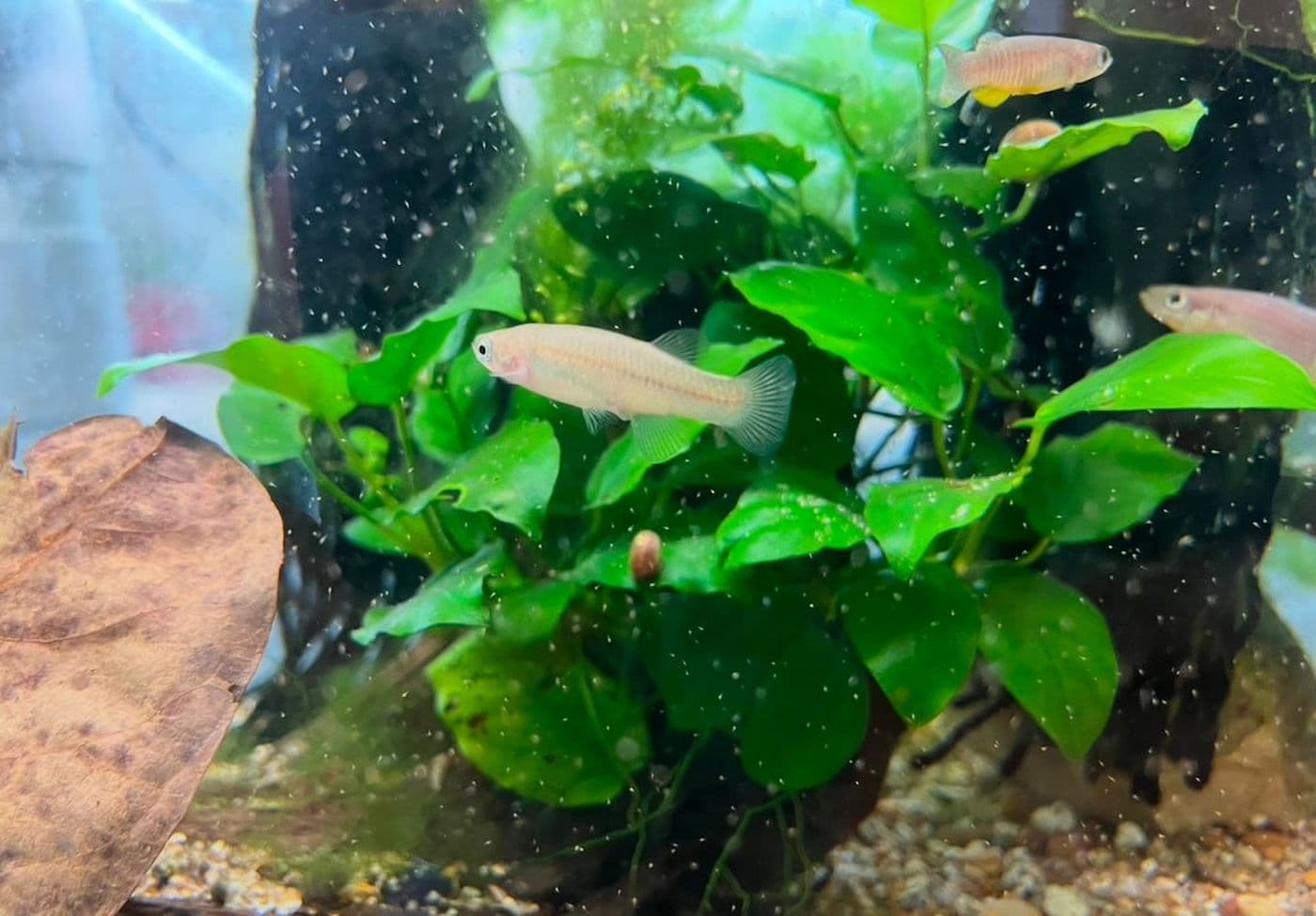
Species Spotlight: Critically Endangered Corfu toothcarp
Posted on: 13 December, 2024
Earlier this year we announced our Reverse the Red pledge to conserve and protect 97 species facing major threats in the wild. Our six flagship species include Critically Endangered turquoise dwarf gecko, Critically Endangered blue-eyed black lemurs, and Critically Endangered Negros bleeding-heart dove, as well as Endangered white-clawed crayfish.
We are now shining the spotlight on the Critically Endangered Corfu toothcarp, Valencia letourneuxi, a freshwater fish found in Albania and Greece.
 The Valenciidae family is among the smallest fish families globally, with just three species, all of which are confined to Europe. These species are Corfu toothcarp, Valencia letourneuxi, Valencia toothcarp, Valencia hispanica, and Peloponnese Valencia, Valencia robertae.
The Valenciidae family is among the smallest fish families globally, with just three species, all of which are confined to Europe. These species are Corfu toothcarp, Valencia letourneuxi, Valencia toothcarp, Valencia hispanica, and Peloponnese Valencia, Valencia robertae.
Here at Bristol Zoological Society, we are leading the European breeding programme to conserve these species that all face a number of threats, from habitat degradation to climate change and pollution, as well as wetland drainage for human water use. Their populations are also declining due to the introduction of an invasive species to their ecosystems, the mosquitofish, Gambusia holbrooki, which is a direct competitor to the toothcarp.
A highly threatened freshwater fish with a short life span of around three years, the Critically Endangered Corfu toothcarp's natural habitats include rivers, freshwater marshes, freshwater springs, and coastal freshwater lagoons in the western part of the Ionian Ecoregion in Greece, as well as Lake Butrinti in Albania.
These toothcarp survive in lowland coastal habitats that were not covered in ice during the last Ice Age and today only inhabit spring-fed streams with rich aquatic vegetation, providing shelter and a wide variety of invertebrate life for them to feed on. They feed primarily on surface-dwelling invertebrates, while skilfully evading predators beneath floating vegetation. The species exhibits striking sexual dimorphism, which means the males and females display different characteristics. The males are more colourful with iridescent scales and unique barring, unlike the females which are a muted grey colour.
 At the zoo, we have been keeping and breeding the Critically Endangered Peloponnese Valencia, a species native to Greece's lower Pinios and Mornos Rivers, for some time. We are now working towards establishing a breeding programme for the Critically Endangered Corfu toothcarp.
At the zoo, we have been keeping and breeding the Critically Endangered Peloponnese Valencia, a species native to Greece's lower Pinios and Mornos Rivers, for some time. We are now working towards establishing a breeding programme for the Critically Endangered Corfu toothcarp.
Having studied the Peloponnese Valencia, the Ectotherm team has observed fascinating breeding behaviours that are displayed during courtship. These findings could help the team understand the needs of the species and we hope that further study will ensure the highest survival rates of the species. Successfully rearing the offspring of these sensitive fish includes implementing preventative measures against fungal infections to giving newly hatched fry nutrient-rich artemia or banana worms.
 Under the guidance of Brian Zimmerman, Director of Conservation and Science for the Society, who is the EEP Coordinator for the family Valenciidae, we’re dedicated to maintaining populations outside of their natural habitat here at Bristol Zoo Project, to protect the future of these extremely rare fish. These efforts are also vital in preserving genetic diversity, supporting future reintroduction programmes, as well as researching disease management, egg survival, and reproductive biology.
Under the guidance of Brian Zimmerman, Director of Conservation and Science for the Society, who is the EEP Coordinator for the family Valenciidae, we’re dedicated to maintaining populations outside of their natural habitat here at Bristol Zoo Project, to protect the future of these extremely rare fish. These efforts are also vital in preserving genetic diversity, supporting future reintroduction programmes, as well as researching disease management, egg survival, and reproductive biology.
We also work collaboratively with the Hellenic Centre for Marine Resources in Greece, to study the species in the wild and implement a variety of measures to safeguard their survival. This collaboration has been in place for 20 years and the successes achieved demonstrate the value of strong partnerships for conservation of some of the world’s rarest species.
At Bristol Zoological Society, we are passionate about preserving the world’s most threatened species, and the beloved Valencias are no exception. The Valenciidae family serves as a reminder of the fragility of aquatic ecosystems and the power of collective conservation efforts. Together, we can secure a future for these magnificent fish!
More information about our conservation work around the world can be found below.

Want to help us save wildlife?
Become a member today for a year of wild adventure, and help protect the animals and habitats you love by supporting our conservation charity.

